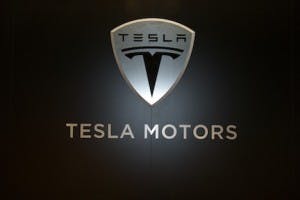
Short traders should get ready for asymmetric trade in Tesla Motors Inc (NASDAQ:TSLA)’s stock moving forward. Looking at how the company is handling its operations, a $100 plus share price is very feasible. In fact, this is a matter of when and not if. Tesla’s key strength is that, unlike other innovative start-ups, it knows the importance of protecting its innovative stance and enhancing the key differentiating factors of its product and brand.
Dealership associations can complain all they want, Tesla made the right move
In a maiden move, Tesla decided that its primary point of contact with its consumers would not be through typical franchises, but through company-owned dealerships. This essentially invalidates the services of dealership car salespersons, who, for a long time, have been deemed to be untrustworthy.
Tesla’s dauntless move sparked a lot of controversy, in the process, attracting several legal tussles. At the fall of March, the Massachusetts Dealer Association joined a growing list of dealer associations that oppose Tesla Motors Inc (NASDAQ:TSLA)’s company-owned store approach. Whether or not this case will go through is an issue that Massachusetts’s court system can best address. Nonetheless, this brewing war between dealerships and Tesla brings some key issues to the spotlight.
1. Is it worthwhile to trade off customer service for a burden-free balance sheet?
The benefit that comes with franchises on the manufacturer’s part is a burden-free balance sheet. Manufacturers have the chance to get inventory off their balance sheet and offload them to franchises. Despite the seemingly favorable prospects that come with this, there is a huge cost. Manufacturers lose control of customer service.
2. Small dealerships understand the market’s need, but do they really understand the product?
One key benefit of dealerships and car sales persons is that they understand the market they serve. They understand the cultural and demographic landscape and know how to filter through. Nonetheless, do they really understand the product they sell? I highly doubt it. That’s why cases of consumers buying products that don’t perform close to even half of what they were made to believe have become commonplace.
Looking at these issues, it comes to note that the involvement of car dealerships favors both the franchise and the manufacturer, but leaves out the buyer. However, the company-owned store approach allows the manufacturer, through in-house salespersons, to explain the real benefits of the product and to highlight each and every feature in the product. In addition, in-house salespersons will be able to package Tesla’s product in a fashion that invariably maintains that all-important innovative edge.
Tesla Motors Inc (NASDAQ:TSLA)’s 2010 move to hire former Apple retail guru George Blankenship will enhance the retail strategy. Blankenship has put in place a strategy that, if implemented well, will build an unquestionably strong brand for Tesla. The strategy is to get feedback on any good or bad customer experience, explain Tesla Motors Inc (NASDAQ:TSLA)’s products and goals, and involve customers in its operations. This not only raises awareness of the brand, but also gives customers a reason to relate with the brand.
The bigwigs should watch out
The populist argument has been that Tesla is far behind bigger competitors General Motors Company (NYSE:GM) and Toyota Motor Corporation (ADR) (NYSE:TM). Indeed, these two have the edge on most accounts. General Motors Company (NYSE:GM) for instance, increased its April China sales 15% to 261,870 units. Back in March, the Cadillac maker managed to increase its China sales by 13%. In fact, the head of General Motors Company (NYSE:GM)’ operations in China, Bob Socia, is ‘cautiously optimistic’ that sales in China will hit 3 million units by the end of 2013.
Toyota Motor Corporation (ADR) (NYSE:TM), however, saw a continued dip in China sales. Its sales fell 6.5% to 76,400 units in April, marking the ninth drop in 10 months. Toyota’s lackluster performance in China is largely due to geopolitical headwinds in the region. Nonetheless, the Japanese automaker still remains the world’s top automaker by virtue of sales.
Performance in China is a key indicator as it is the biggest automobile market in the world.
I don’t see Tesla catching up anytime soon. What I however see is prolonged persistence and a chance to create its own market; a chance to revolutionize the automobile industry as we know it. Already, Tesla CEO Elon Musk has amended the financing deal for Model S. The amended financing deal will allow Tesla to gain more traction among middle income consumers. Under the amendments, the repayment period will be 72 months rather than the previous 63 months. The resale value of Model S will also top other luxury cars in its segment.
Tesla Motors Inc (NASDAQ:TSLA)’s bid to enhance innovation in the automobile industry is its ticket to unprecedented highs. This, coupled with the fact that it has plans of roping in middle income and budget tended consumers, should bring huge sales in the future. Go long on Tesla.
The article Tesla Shorts Will Be Disappointed originally appeared on Fool.com and is written by Lennox Yieke.
Copyright © 1995 – 2013 The Motley Fool, LLC. All rights reserved. The Motley Fool has a disclosure policy.


